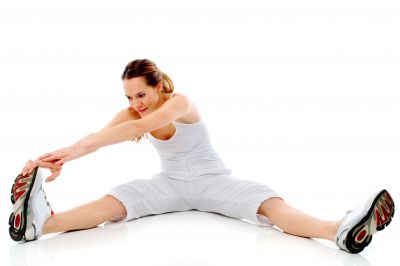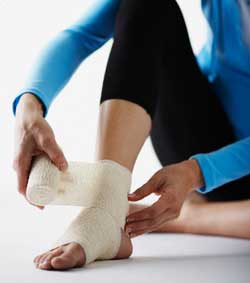
So, you’ve started your journey of running a 5k. That’s awesome!
But before you get hyped up, let’s take a look on all the negative stuff that may occur. It’s better to hear them now, familiarize with the types of injuries that may occur, know what to do in order to prevent them.
Naive as it may sound to some, running a 5k is certainly not a joke. I stated this couple of times in the previous posts, I’m about to do that time and again.
You may ask why? Well, because simply, it’s the truth. This type of physical exercise will define itself under certain category that matches no other. Covering 5 thousand meters, and of top of that going for the best time on the stopwatch is not an easy thing to do.
Your body will get tired, your muscles overwhelmed. Marathons are a different story, you would usually take more time to prepare yourself and the running is not that much intense. Sure they are MUCH harder, no doubt about that, but this is a different type of run.
So, guessing that you are engaging in this challenge for the first time, or that you are quite reckless (as I was, when I started to prepare for the 5k run), there are couple of things to cover.
First of all you must come with terms that running injuries are likely to happen even if you are doing everything as you should. Sometimes “the couch to 5k” idea ends up with such results. That’s the reality.
On the very start you must also realize that the injuries are most likely to occur on the lower parts of your leg section and mostly the joints. Knees also may suffer, and if they do, you are very likely to finish the preparation early on.
However, there are a couple of things you can do to minimize the chance of a 5k running injuries.
Well, knowing that your legs are the ones that take the most beating in running a 5k, it would be logical enough to take care of them the most. But there are also couple of other things that may help.
1. Shoes and Socks
I mentioned them in the previous post, I will mention them here too. Having a running shoes that fit you well and you feel comfortable in, is the first thing to look for and certainly one of the most important key points to running a 5k more relaxed, secure and with a less chance of an injury happening.
On top of that, you should also try to avoid uncomfortable material for socks, and overall socks that over tighten your feet. That may cause more sweating and germs, and also swelling for some, since the heat is ten times higher, and the circulation of blood is lowered. You wouldn’t like that happening.
2. Proper feet hygiene
Another thing that may cause you discomfort is blisters and peeling of the skin. This is a huge obstacle, since skin is regenerating slower than the time you will need for the preparation. That’s why proper feet hygiene feet is a must during your training.
Washing them with skin care soap every time after a run is a must. It’s also good to do that even before you put the running shoes on, but be wary of too much hydration, because it will most certainly make the skin easier to peel.
Use a cream to make your skin softer, but in the same time more resistant. This alongside with the proper hygiene ought to do the trick.
3. Stretching and warming up
Now again something I mentioned earlier – stretch each and every time before you start a run. Doing this you are significantly lowering the chance of an injury. And it only takes a couple of minutes if you do it right, but even if you don’t you’re still getting the most of the benefits.
Your legs are about to take the punch, so stretch them in every way possible. Focus on the movement of your joints and feel the stretch there.

4. Strengthen the (leg) muscles with exercises
I mentioned above a different activity. Well, if you like to achieve some results, or just make sure your body will be less prone to injuries, then keeping yourself active even on days when you are not running is crucial.
That way you are assured that your body will be more prepared in terms of energy, muscle strength, endurance, cardio etc.
Consider doing some exercises for strengthening the legs muscles. Something like steps, squats, even try bicycling. What this does is giving you a guarantee that your legs are more prepared for the race ahead, and strengthening them up will also give you the upper hand on injuries. Just remember to avoid overdoing it.
Another muscle group that is very important when it comes to performing strenuous exercise is the abdominal section. The core, simply put, is your biggest ally for keeping balance, and generating power in your movements. As Bruce lee once said – if you don’t have a strong core, there is no place for you in the martial arts. The same, I believe, is true even when it comes to running.
That being said, you need to strengthen your core, or at least try to burn belly fat and reduce the weight that you’ll have to carry on your waist. It is easier said than done, but even if you give yourself two weeks and say “I’ll keep an eye on my diet”, the results will be amazing. Remember, compound progress eventually piles up!
5. Learn when to take a break
This may seem obvious to some, but it’s one of the main causes for running injuries. Knowing when to run and when to rest is a must. Just listen to your body signals. Running couple of days in row in the beginning may cause serious stress to the muscles, so they are more likely to lose some of their functions, and the effort will fall on the knees and joints.
Also try to avoid some other heavy physical activity on the days of your runs. Even though a 3 mile run may sound silly for some, doing other demanding physical activities in the day too, can make your body so stressed that an injury occurring will be the most likely expectation.
In fact that’s how I injured my knee when I first started to prepare for the race. And that naturally meant race over.
The day I injured my knee I was doing more than just running and training for the race. The run was scheduled for the afternoon, and in the morning I went rollerblading for a couple of hours.
This caused a huge amount of stress to my legs, and when I ran the same day, the muscles simply gave up on me, and the knee took the punch. So beware – you should have days only for running, others for some other different physical activity, and some for rest.
6. Proper diet and hydration
Another thing you should consider is keeping the weight down, and staying light. Why is this important? Well, not only it will make you faster, more agile, but it will also make you more flexible, and lower the chance of injuries.
Running with ten to twenty pounds more than you should carry will most certainly be a BIG stress on the joints and knees. That alone explains the point.
I know that there are some people out there that are like: “French fries? – YES PLEASE! Double size ‘em too.”And I hate being the one that will break it up for them, but running a 5k requires you to make some changes in the way you eat and what you eat.
That being said you will need to avoid the fat-rich food as much as you can, and focus on protein and some carbs the most.
Protein is crucial for the rejuvenation of the muscle tissue, and avoiding carbs is not that clever here. Maybe in bodybuilding, sure, but here you will need those carbs to fuel you in order to finish the training session on run days.
But little did people know that carbs can come from fruits and veggies as well. So having a well-balanced diet that includes more fruits and veggies than anything else and maybe some meat too, is going to make sure you have the upper hand when it comes to being fit and preventing injuries, energy loss etc.
Also remember to keep your body hydrated with drinking as much water as you can. However, avoid drinking, or even eating half hour or one hour before you run.
This depends on you alone. I’ve seen people running after a meal, so this is entirely up to the individual, however keep in mind that your performance, as well as health may be compromised.

If you need to remember one thing, let it be this: Don’t underestimate the 5k race. Whether you have some experience with running and are going for your personal best time, or you’re a recently retired couch potato imagining the glorious finish over the line. Take it seriously from the beginning and it will most likely result with accomplishing your goal with less or no running injuries, while having fun and enjoying the run.
However, if you did everything you can to prevent it, but still, you experienced some muscle pain throughout the training schedule for the 5k, you should definitely take a rest and depending on the severity of the pain consult with a physiotherapist.
In the end, I can just hope that you have a great time, enjoying the race and avoiding the injuries.
P.S. Can you suggest any other injury prevention methods, or maybe share some experience of dealing with them ?
Read the other parts of the Beginner’s 5k Running Plan series: